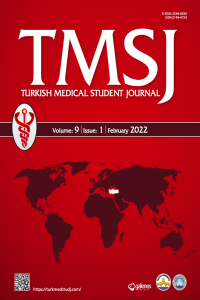A FAHR’S DISEASE CASE PRESENTING WITH DEMENTIA
A FAHR’S DISEASE CASE PRESENTING WITH DEMENTIA
Aims: Fahr’s disease is characterized by a bilateral striopallidodentate calcinosis, related to various neurologic and psychiatric disorders. It is a rare disease which can occur both sporadically or hereditarily. While the clinical symptoms related to calcifications include parkinsonism, dystonia, tremor, chorea, ataxia, dementia and mood disorders, some asymptomatic cases have also been reported. With this study, an overall view of Fahr’s disease is aimed, by investigating the 65-year-old patient considering her clinical, endocrinological and radiologic aspects, also utilizing the available literature Case report: A 65-year-old female patient with a six-year history of forgetfullness and 3-months history of walking difficulty, unbalance and general reduction of spontaneous movement complaints was hospitalized with parkinsonism pre-diagnosis. Laboratory results indicated primary hyperparathyroidism. CT scans also revealed diffuse bilateral intracranial calcifications. The diagnosis of Fahr’s disease was confirmed after clinical investigations and exclusion of other diseases which cause intracranial calcifications. Conclusion: This case implies the importance of keeping Fahr’s disease in consideration in cases with primary degenerative dementia in the foreground and indistinct motor dysfunctions adding subtly to the symptoms, and manifestation of hypocalcaemia.
Keywords:
Fahr’s disease intracranial calcification, hyperparathyroidism, Parkinson’d disease, dementia,
- ISSN: 2148-4724
- Başlangıç: 2014
- Yayıncı: Trakya Üniversitesi
Sayıdaki Diğer Makaleler
A FAHR’S DISEASE CASE PRESENTING WITH DEMENTIA
Aslıhan AKŞAR, Jülide YILMAZ, Hazel TANRIKULU, Aslan TEKATAŞ
Ahmet AKIN, Hamza BERLİK, M. Burak BİLGİLİ, Zafer DEMİR, Mustafa GENC, Abdulsamet GUNAY, İbrahim HACİBEY, Serdar KARAKOC, Yusuf Alparslan KUTLU, Ahmet UNAL, Mustafa OZTURK
LEVEL OF INFORMATION ABOUT RADIATION AMONG MEDICAL STAFF WORKING IN OPERATING ROOMS WITH FLUOROSCOPY
Ege Miray YILDIZ, Yonca KANDEMİR, Koray DEMİRCİ, Mert ÖZCAN
